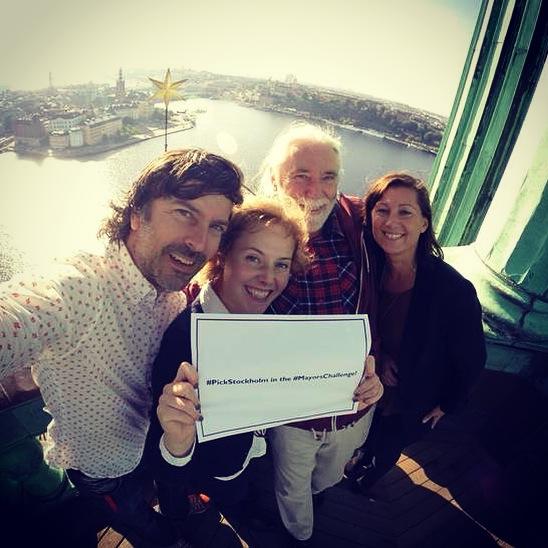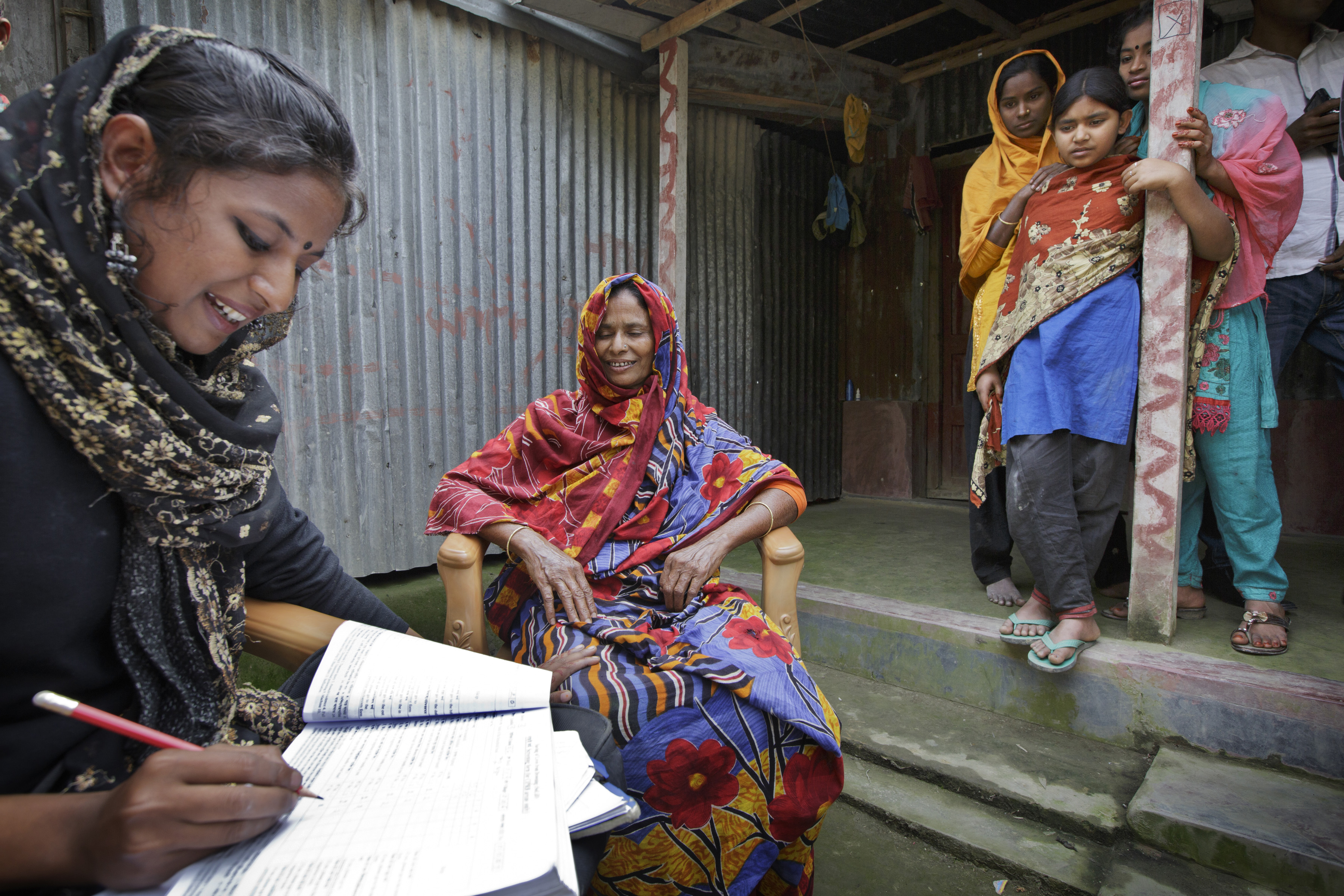10 Cities Taking Action on Climate
February 25, 2015
Which cities are leading the way on climate change reporting?
The answer is a little bit clearer thanks to the recent work of CDP and C40—two organizations funded by Bloomberg Philanthropies. CDP is the largest global reporting platform for cities. The program is open to any city government, regardless of size or geographic location.
Read more
Diplomas for Female Coffee Growers in Rwanda
February 10, 2015
More than 800 women in Rwanda graduated in January from a year-long training program run by Bloomberg Philanthropies partner Sustainable Harvest that teaches best practices for growing and harvesting coffee. These women farmers (300 are pictured here) in two rural farming districts of post-conflict Rwanda are learning to deliver high-quality coffee to buyers around the globe, while acquiring a clear path to being economically self-sufficient.
Read moreThe ‘Why’ of eAdvising
February 4, 2015
Meet Andrew Meriwether, one of the virtual advisors of the Bloomberg Philanthropies’ College Access and Success initiative working at College Advising Corps. In a guest blog post, Andrew shares with us why virtual advising is so important.
Read more
Little Sun Expands in 2014
January 9, 2015
Little Sun, which brings portable solar-powered lamps to rural Africa, had a benchmark year in 2014. Bloomberg Philanthropies made its first ever “impact” investment in Little Sun, helping the socially responsible business expand its reach to four new countries in sub-Saharan Africa and scale up production and sales of its distinctive and sustainable lamps.
Read moreGlobal Approach: Bloomberg Philanthropies initiatives that made a difference in 2014
December 31, 2014
From the mercados of Mexico to the coasts of Chile, from a coffee farm in Rwanda to a health clinic in Tanzania, from a hamlet in Bangladesh to a fishing village in The Philippines, and in the world’s great cities including Johannesburg, Barcelona, and Istanbul, Bloomberg Philanthropies worked across six continents in 2014 to create better, longer lives for the greatest number of people.
We used data to find some of the world’s most pressing problems, implement solutions, and monitor progress.
Read more
Biochar-ging Ahead to Engage Citizens in Combating Climate Change
December 22, 2014
Stockholm, one of the five winning cities in the 2014 Mayors Challenge competition, will create a citywide program that activates citizens as front-line change agents to combat climate change. Together, the city and its residents will produce biochar, an organic substance that increases tree growth, sequesters carbon, and purifies storm water runoff. The City of Stockholm’s Björn Embrén explains the crucial ingredient at the core of their idea and how it will use the Mayors Challenge Prize to accomplish this ambitious goal.
Read moreAs the Innovation Team program expands, five pioneer mayors speak about i-teams successes in their cities
December 12, 2014
On Monday, December 15, we will announce the latest cities to join Bloomberg Philanthropies Innovation Teams program. The i-teams program aims to improve the capacity of City Halls to effectively design and implement new approaches that improve citizens’ lives – relying on data, open innovation, and strong project and performance management to help mayors address pressing urban challenges.
This week, the first five mayors to receive i-team grants from Bloomberg Philanthropies wrote about their experiences in an op-ed series on CNN Money. Over the past three years, these Mayors have mobilized i-teams to equip municipal government not only with the capacity to strategize, but the tools, metrics, partnerships and techniques needed to bring ideas to reality and improve citizens’ quality of life.
Read moreNew Health Crisis in Developing Countries: Heart attack, stroke, cancer, diabetes become the biggest killers
December 9, 2014
By Bloomberg Philanthropies Public Health Team
The biggest global health crisis in low- and middle-income countries is not Ebola, nor is it HIV/AIDS. While the fight against those infectious diseases remains critically important, the emerging health issue in low- and middle-income countries is noncommunicable diseases (NCDs). These are defined as diseases that result in chronic illnesses. The crisis is related to lack of preventative measures and healthcare, as well as poorly functioning health systems. Noncommunicable diseases are becoming the biggest killers.
That is the message of a landmark new report by the Council on Foreign Relations, funded in part by Bloomberg Philanthropies, titled The Emerging Global Health Crisis: Noncommunicable Diseases in Low- and Middle-Income Countries. The report recommends specific steps the United States can take now and in the near and long term to use its leadership position on global health issues to address this crisis in lower-income countries.
Read moreAre You Taking the Public Art Challenge?
December 2, 2014
By Mitch Landrieu, Mayor of the City of New Orleans and Chair of the Tourism, Arts, Parks, Entertainment and Sports (TAPES) Standing Committee at the US Conference of Mayors (USCM)
With the deadline for the Bloomberg Philanthropies Public Art Challenge approaching on December 15, I am reflecting on how art transforms cities into vibrant cultural centers, revitalize neighborhoods and makes cities more appealing to visit, work and live.
Read more
WHO Report Outlines Ten Ways to Prevent Drowning
November 24, 2014
By Bloomberg Philanthropies Public Health Team
To help put better data and context behind this leading cause of death, Bloomberg Philanthropies helped fund a new World Health Organization study The Global Report on Drowning; Preventing a Leading Killer. Bloomberg Philanthropies CEO Patricia E. Harris and Dr. Kelly Henning of the Foundation’s public health team, travelled to Geneva to launch the report which is the first major study of its kind to look at drowning deaths worldwide, their causes, and to recommend practical solutions that will prevent these needless deaths.
“Despite the terrible toll drowning takes on communities around the world – especially in low- and middle-income countries – it hasn’t gotten the attention it deserves as a serious and preventable problem. This report can help change that, and it will help us save many lives,” said Patricia E. Harris.
Read more